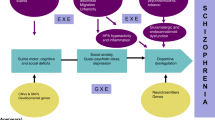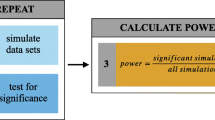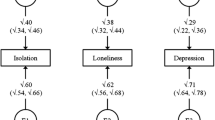Abstract
Previously we and others have shown evidence for genetic influences on political attitudes and sociodemographic indicators (Martin 1987; Posner et al. 1996; Truett et al. 1992; Eaves et al. 1999). However, the nature of the relationship between political attitudes, social indictors and voting behavior has not been investigated. While heritability estimates for social and political attitudes have been reported in previous research, the heritability for vote choice has not. Furthermore, if vote choice is heritable, it is unclear whether the heritable component can be accounted for through the genetic influence on related social and political traits, or if there exists a unique genetic component specific to voting behavior. In mailed surveys of adult Australian twins, we asked respondents to indicate their usual voting preference as well as attitudes on contemporary individual political items. When vote choice was dichotomized as Labor versus Conservative, twin correlations were r mz = 0.81 (1661 pairs), and r dz = 0.69 (1727 pairs) consistent with modest genetic influence (a 2 = 0.24). However, multivariate genetic analysis showed no unique genetic contribution to voting preference; rather, the genetic influence in vote choice could be explained by shared genetic influences in perceived social class, church attendance and certain key political attitude items.
Similar content being viewed by others
References
Akaike H (1987) Factor analysis and AIC. Psychometrica 52:317–332
Alexander RD (2004) Evolutionary selection and the nature of humanity. In: Hosle V, Illies C (eds) Darwinism and philosophy. University of Notre Dame Press, Notre Dame, pp 424–495
Alford J, Funk C, Hibbing J (2005) Are political orientations genetically transmitted? Am Polit Sci Rev 99(2):153–167
Alford J, Hibbing J (2006) Investigating the genetic transmission of political attitudes and behaviors. Proposal to the Political Science Program of NSF
Baker LA, Trelaor SA, Reynolds CA, Heath AC, Martin NG (1996) Genetics of educational attainment in Australian twins: sex differences and secular changes. Behav Genet 26:89–102
Bouchard T, Segal N, Tellegen A, McGue M, Keys M, Krueger R (2003) Evidence for the construct validity and heritability of the Wilson Patterson Conservatism Scale: a Reared Apart Twins Study of Social Attitudes. Pers Indiv Differ 34:959–969
Bruell J (1970) Heritability of emotional behavior. In: Black P (ed) Physiological correlates of emotion. Academic Press, New York
Campbell A, Converse PE, Miller WE, Stokes DE (1960) TheAmerican voter. Wiley, New York
Carmines EG, Stimson JA (1980) The two faces of issue voting. Am Polit Sci Rev 74:78–91
Cook TE (1985) The bear market in political socialization and the costs of misunderstood psychological theories. Am Polit Sci Rev 79:1079–1093
Corning P (1971) The biological bases of behavior and some implications for political science. World Polit 23(2):321–370
Curtin J (1998) The gender gap in Australian elections, Research Paper no. 3. Parliamentary Research Service, Canberra
Darwin, C, n.d. (1859, [1871]). The origin of species and the descent of man. The Modem Library, New York
Downs A (1957) An economic theory of democracy. Harper, New York
Druckman JN (2001) The implications of framing effects for citizen competence. Polit Behav 23:225–256
Druckman JN (2004) Political preference formation: competition, deliberation, and the (ir)relevance of framing effects. Am Polit Sci Rev 98:671–686
Durkheim E (1895 [1964]). The rules of sociological methods. Free Press, London
Eaves LJ, Eysenck HJ, Martin NG (1989) Genes, culture and personality; an empirical approach. Academic Press, London
Eaves LJ, Heath AC, Martin NG, Maes HH, Neale MC, Kendler KS, Kirk KM, Corey LA (1998) Comparing the biological and cultural inheritance of stature and conservatism in the kinships of monozygotic and dizygotic twins. American Psychopathological Association Yearbook
Eaves L, Heath A, Martin N, Maes H, Neale M, Kendler K, Kir K, Corey L (1999) Comparing the biological and cultural inheritance of personality and social attitudes in the Virginia 30 000 study of twins and their relatives. Twin Res 2:62–80
Grattan M (ed) (2000) Australian Prime Ministers. Frenchs Forest, NSW
Heath AC, Slutske WS, Bucholz KK, Madden PAF, Martin NG (1997) Behavior genetic methods in prevention research: an overview. In: Bryant KJ, Windle M, West SG (eds) The science of prevention: methodological advances from alcohol and substance abuse research. American Psychological Association, Washington DC, pp 123–163
Hermann, MG (2002) Political psychology as a perspective in the study of politics. In: Monroe KR (ed) Political psychology. LEA, Mahwah, NJ
Iyengar S, Kinder DR (1987) News that matters: television and American opinion. University of Chicago Press, Chicago
Jaensch D (1989) Power politics: Australia’s party system, 2nd edn. Sydney
Jardine R, Martin NG (1984) No evidence for sex-linked or sex-limited gene expression influencing spatial orientation. Behav Genet 14:345–354
Jöreskog K, Sörbom D (1999) LISREL 8 USER’s guide. University of Uppsala, Uppsala, Sweden
Kendler KS, Walters EE, Truett KR, Heath AC, Neale MC, Martin NG, Eaves LJ (1995) A twin-family study of self-report symptoms of panic-phobia and somatization. Behav Genet 25:499–515
Landemore H (2004) Politics and the economist-king: is rational choice theory the science of choice? J Moral Philos 1(2):177–197
Lichbach MI (2003) Is rational choice theory all of social science? University of Michigan Press, Ann Arbor
Loehlin JC (1996) The Cholesky approach: a cautionary note. Behav Genet 26(1):65–70
Loehlin JC (1998) Latent variable models: an introduction to factor, path, and structural analysis, 3rd edn. Lawrence Erlbaum Associates, Mahwah, NJ
Martin NG, Martin PG (1975) The inheritance of scholastic abilities in a sample of twins. I. Ascertainment of the sample and diagnosis of zygosity. Ann Human Genet 39:213–218
Martin NG, Eaves LJ, Heath AC, Jardine R, Feingold LM, Eysenck HJ (1986) Transmission of social attitudes. Proc Natl Acad Sci 83:4364–4368
Martin NG (1987) Genetic differences in drinking habits, alcohol metabolism and sensitivity in unselected samples of twins. Genetics and Alcoholism. G. H. W. and A. D. P. New York, Alan R. Liss, 109–119
Masters RD (1990) Evolutionary biology and political theory. Am Polit Sci Rev 84(1):195–210
Merelman RM (1986) Revitalizing political socialization. In: Herrmann R (ed) Political psychology. Jossey-Bass, San Francisco
Miller JM, Krosnick JA (2004) Threat as a motivator of political activism; a field experiment. Polit Psychol 25:505–523
Moon J, Sharman C (2003) Australian politics and Government: the Commonwealth, the States and the Territories. Cambridge University Press, New York
Neale MC, Cardon LR (1992) Methodology for genetic studies of twins and families. Kluwer Academic Publishers, Dordrecht, The Netherlands
Neale MC, Boker S, Xie G, Maes H (2003) Mx: statistical modeling, 5th edn. Department of Psychiatry, Virginia Commonwealth University, Richmond, VA
Nelson TE, Clawson RA, Oxley Z (1997) Media framing of a civil liberties controversy and its effect on tolerance. Am Polit Sci Rev 91(3):567–584
Nelson TE (2004) Policy goals, public rhetoric, and political attitudes. J Polit 66:581–605
Newman G (1996) Federal election results 1949–96, Background Paper no. 1. Parliamentary Research Service, Canberra
Olson J, Vernon P, Jang K (2001) The heritability of attitudes: a study of twins. J Personal Soc Psychol 80(6):845–860
Page BI, Brody RA (1972) Policy voting and the electoral process: the Vietnam war issue. Am Polit Sci Rev 66:9769–9995
Page B, Jones C (1979) Reciprocal effects of policy preferences, party loyalties and the vote. Am Polit Sci Rev 73:1071–1090
Popkin SL (1991) The reasoning voter. University of Chicago Press, Chicago
Posner SF, Baker LA, Heath AC, Martin NG (1996) Social contact; social attitudes and twin similarity. Behav Genet 26(2):123–134
Sapiro V, Rosenstone SJ, the National Election Studies (2002) American National Election Studies Cumulative Data File, 1948–2000 [Computer file]. 11th ICPSR version. Ann Arbor, MI: University of Michigan, Center for Political Studies [producer], 2002. Ann Arbor, MI: Inter-university Consortium for Political and Social Research [distributor], 2002
Sears DO (1989) Whither political socialization research? The question of persistence. In: Ichilov O (ed) Political socialization, citizenship education, and democracy. Teachers College Press, New York
Sigelman L (2006) Report of the editor of the American Political Science Review, 2004–5. PS: Polit Sci Polit 40:171–173
Simms M (ed) (1996) The paradox of parties: Australian political parties in the 1990s. St. Leonards, NSW
SPSS Inc. (2003) SPSS for Windows (Release 13.0). [Computer Software]. SPSS Inc., Chicago
Sudman S, Bradburn N, Schwarz N (1996) Thinking about answers: the application of cognitive processes to survey methodology. Jossey-Bass, San Francisco, CA
Tooby J, Cosmides L (1992) The psychological foundations of culture. In: Barkow JH, Cosmides L, Tooby J (eds) The adapted mind: evolutionary psychology and the development of culture. Oxford University Press, Oxford
Tourangeau R, Rips LJ, Rasinski K (2000) The psychology of survey response. Cambridge University Press, Cambridge
Truett KR, Eaves LJ, Meyer JM, Heath AC, Martin NG (1992) Religion and education as mediators of attitudes: a multivariate analysis. Behav Genet 22(1):43–62
Ward I (1990) The political chronicle: Australia January–June 1990. Aust J Polit Hist 30(3):242
Warhurst J (ed) (1997) Keeping the bastards onest: the Australian democrats first twenty years. NSW Editors, St. Leonards
Whitfield JB, Zhu G, Madden PAF, Neale MC, Heath AC, Martin NG (2004) The genetics of alcohol intake and of alcohol dependence. Alcoholism: Clin Exp Res 28:1153–1160
Whitfield JB, Zhu G, Heath AC, Martin NG (2005) Choice of residential location: chance, family influence, or genes? Twin Res Human Genet 8:22–26
Wilson GD, Patterson JR (1968) A new measure of conservatism. Br J Soc Clin Psychol 7:264–269
Wilson EO (1998) Consilience: the unit of Knowledge. Alfred knopf, New York
Zaller JR (1992) The nature and origins of mass opinion. Cambridge University Press, Cambridge
Acknowledgments
Data collection was funded by NHMRC grants to NGM and NIAAA grants to ACH. We thank David Smyth for database support and the twins for their cooperation.
Author information
Authors and Affiliations
Corresponding author
Additional information
Edited by Danielle Posthuma
Rights and permissions
About this article
Cite this article
Hatemi, P.K., Medland, S.E., Morley, K.I. et al. The Genetics of Voting: An Australian Twin Study. Behav Genet 37, 435–448 (2007). https://doi.org/10.1007/s10519-006-9138-8
Received:
Accepted:
Published:
Issue Date:
DOI: https://doi.org/10.1007/s10519-006-9138-8




